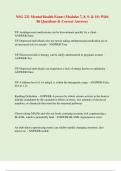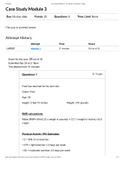NSG 221 Mental Health Exam (Modules 7, 8, 9, & 10) With
86 Questions & Correct Answers
T/F Antidepressant medicatoins can be discontinued quickly by a client -
ANSWER-False
T/F Depressed individuals who are newly taking antidepressant medication are at
an increased risk for suicide - ANSWER-True
T/F Electroconvulsive therapy can be safely adminsitered to pregnant women -
ANSWER-Tru
T/F Depressed individuals can experience a lack of energy known as anhedonia -
ANSWER-False
T/F A lithium level of 1.6 mEq/L is within the therapeutic range - ANSWER-False
(0.6 to 1.2)
Kindling Definition - ANSWER-A process by which seizure activity in the brain is
initially stimulated by the cumulative effects of stress, low amounts of electrical
impulses, or chemicals that sensitize the neuronal pathways
Clients taking MAOIs and who eat foods contiaing tyramine risk experiencing a
BLANK, which is potentially fatal - ANSWER-BLANK: hypertensive crisis
An individual experiencing mania can exhibit rapidly changing emotions, alos
known as: - ANSWER-Liable
,What is the term that refers to having thoughts of killing onself? - ANSWER-
Suicidal Idiation
Mild Anxiety Definition - ANSWER-Mild anxiety is a sensation that something is
different and warrants special attention. Sensory stimulation increases and helps
the person focus attention to learn, solve problems, think, act, feel, and protect him
or herself. Mild anxiety often motivates people to make changes or engage in goal-
directed activity.
Mild Anxiety Physiological Responses: - ANSWER-Restlessness, Fidgeting, GI
"butterflies", Difficulty Sleeping, Hypersensitivity to Noise.
Moderate Anxiety Definition - ANSWER-Moderate anxiety is the disturbing
feeling that something is definitely wrong; the person becomes nervous or agitated.
In moderate anxiety, the person can still process information, solve problems, and
learn new things with assistance from others. He or she has difficulty concentrating
independently but can be redirected to the topic.
Moderate Anxiety Physiological Responses: - ANSWER-Muscle Tension,
Diaphoresis, Pounding Pulse, Headache, Dry Mouth, Fast Speech, GI Upset,
Frequent Urination
Severe Anxiety/Panic Definition - ANSWER-As the person progresses to severe
anxiety and panic, more primitive survival skills take over, defensive responses
ensue, and cognitive skills decrease significantly. A person with severe anxiety has
trouble thinking and reasoning. Muscles tighten, and vital signs increase. The
person paces; is restless, irritable, and angry; or uses other similar emotional-
psychomotor means to release tension. In panic, the emotional-psychomotor realm
predominates with accompanying fight, flight, or freeze responses. Adrenaline
surge greatly increases vital signs. Pupils enlarge to let in more light, and the only
cognitive process focuses on the person's defense.
, Severe Anxiety Physiological Response: - ANSWER-Severe headache, Nausea,
vomiting, and diarrhea, Trembling, Rigid stance, Vertigo, Pale, Tachycardia, Chest
pain
Panic Physiological Responses: - ANSWER-May bolt and run or totally immobile
and mute, Dilated pupils, Increased blood pressure and pulse, Flight, fight, or
freeze
Nursing Interventions Mild Anxiety: - ANSWER-Mild anxiety is an asset to the
client and requires no direct intervention. People with mild anxiety can learn and
solve problems and are even eager for information. Teaching can be effective when
the client is mildly anxious.
Nursing Interventions Moderate Anxiety: - ANSWER-With moderate anxiety, the
nurse must be certain that the client is following what the nurse is saying. The
client's attention can wander, and he or she may have some difficulty concentrating
over time. Speaking in short, simple, and easy-to-understand sentences is effective;
the nurse must stop to ensure that the client is still taking in information correctly.
The nurse may need to redirect the client back to the topic if the client goes off on
a tangent.
Nursing Interventions: Panic - ANSWER-During panic anxiety, the person's safety
is the primary concern. The nurse must keep talking to the person in a comforting
manner, even though the client cannot process what the nurse is saying. Going to a
small, quiet, and nonstimulating environment may help reduce anxiety. The nurse
can reassure the person that this is anxiety, it will pass, and he or she is in a safe
place. The nurse should remain with the client until the panic recedes. Panic-level
anxiety is not indefinite, but it can last from 5 to 30 minutes.
Nursing interventions Severe Anxiety: - ANSWER-When anxiety becomes severe,
the client can no longer pay attention or take in information. The nurse's goal must
be to lower the person's anxiety level to moderate or mild before proceeding with





